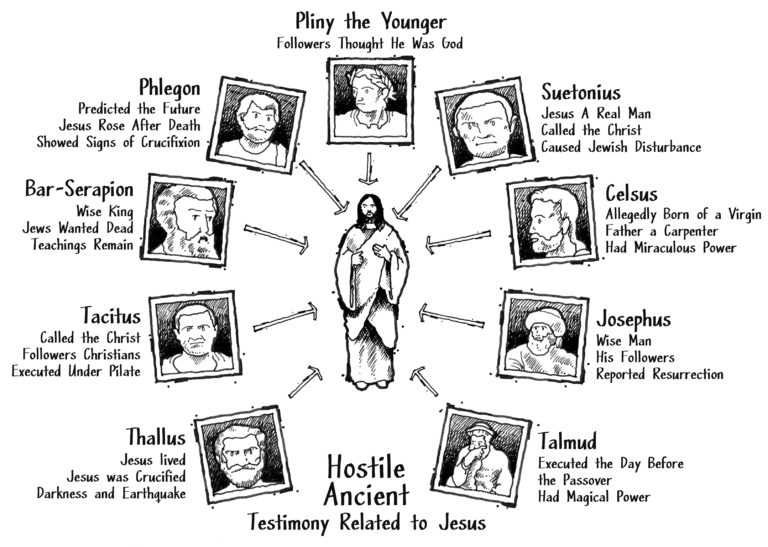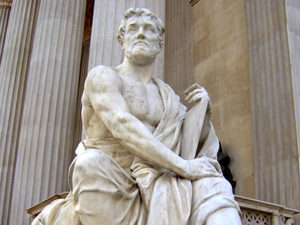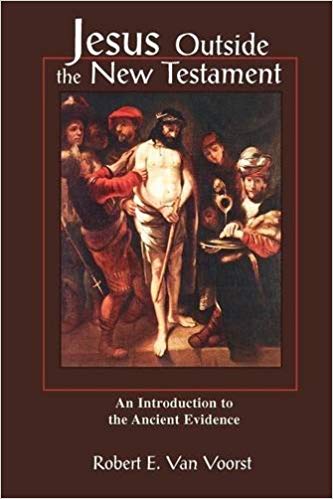- Dec 28, 2017
- 3,779
- 2,856
- Country
- United States
- Faith
- Christian
- Marital Status
- Private
I saw another thread about this, but I figured that I would post this information here :
This video was made by Chris White and References some of these Sources :
• CORNELIUS TACITUS (55 - 120 A.D.)
Tacitus - Wikipedia
“Consequently, to get rid of the report, Nero fastened the guilt and inflicted the most exquisite tortures on a class hated for their abominations, called Christians by the populace. Christus, from whom the name had its origin, suffered the extreme penalty during the reign of Tiberius at the hands of one of our procurators, Pontius Pilatus, and a most mischievous superstition, thus checked for the moment, again broke out not only in Judea, the first source of the evil, but even in Rome, where all things hideous and shameful from every part of the world find their centre and become popular.”
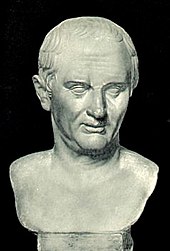
• GAIUS SUETONIUS TRANQUILLUS (69 - 130 A.D.)
Suetonius - Wikipedia
"During his reign many abuses were severely punished and put down, and no fewer new laws were made: a limit was set to expenditures; the public banquets were confined to a distribution of food; the sale of any kind of cooked viands in the taverns was forbidden, with the exception of pulse and vegetables, whereas before every sort of dainty was exposed for sale. Punishment was inflicted on the Christians, a class of men given to a new and mischievous superstition. He put an end to the diversions of the chariot drivers, who from immunity of long standing claimed the right of ranging at large and amusing themselves by cheating and robbing the people. The pantomimic actors and their partisans were banished from the city."
• THALLUS (~ 52 A.D.)
Thallus (historian) - Wikipedia
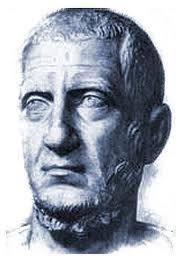
• PLINY THE YOUNGER (63 - 113 A.D)
Pliny the Younger - Wikipedia
“They (the Christians) were in the habit of meeting on a certain fixed day before it was light, when they sang in alternate verses a hymn to Christ, as to a god, and bound themselves by a solemn oath, not to any wicked deeds, but never to commit any fraud, theft or adultery, never to falsify their word, nor deny a trust when they should be called upon to deliver it up; after which it was their custom to separate, and then reassemble to partake of food—but food of an ordinary and innocent kind.”

• CELSUS (~ 178 A.D.)
Celsus - Wikipedia
“Jesus had come from a village in Judea, and was the son of a poor Jewess who gained her living by the work of her own hands. His mother had been turned out of doors by her husband, who was a carpenter by trade, on being convicted of adultery [with a soldier named Panthéra (i.32)]. Being thus driven away by her husband, and wandering about in disgrace, she gave birth to Jesus, *****. Jesus, on account of his poverty, was hired out to go to Egypt. While there he acquired certain (magical) powers which Egyptians pride themselves on possessing. He returned home highly elated at possessing these powers, and on the strength of them gave himself out to be a god.”
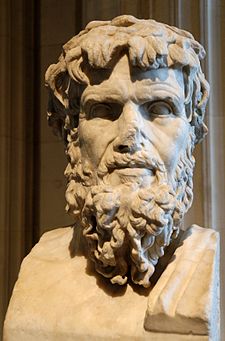
• LUCIAN OF SAMOSATA (120 - ~180 A.D.)
Lucian - Wikipedia
“The Christians, you know, worship a man to this day—the distinguished personage who introduced their novel rites, and was crucified on that account….You see, these misguided creatures start with the general conviction that they are immortal for all time, which explains the contempt of death and voluntary self-devotion which are so common among them; and then it was impressed on them by their original lawgiver that they are all brothers, from the moment that they are converted, and deny the gods of Greece, and worship the crucified sage, and live after his laws. All this they take quite on faith, with the result that they despise all worldly goods alike, regarding them merely as common property.” (Lucian, The Death of Peregrine. 11-13)

• MARA BAR-SERAPION (Post 70 A.D)
Mara bar Serapion on Jesus - Wikipedia
“What benefit did the Athenians obtain by putting Socrates to death? Famine and plague came upon them as judgment for their crime. Or, the people of Samos for burning Pythagoras? In one moment their country was covered with sand. Or the Jews by murdering their wise king?…After that their kingdom was abolished. God rightly avenged these men…The wise king…Lived on in the teachings he enacted.”
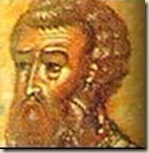
• FLAVIUS JOSEPHUS (37 - 100 A.D.)
Josephus - Wikipedia
“Now around this time lived Jesus, a wise man. For he was a worker of amazing deeds and was a teacher of people who gladly accept the truth. He won over both many Jews and many Greeks. Pilate, when he heard him accused by the leading men among us, condemned him to the cross, (but) those who had first loved him did not cease (doing so). To this day the tribe of Christians named after him has not disappeared” (This neutral reconstruction follows closely the one proposed by John Meier,

• THE BABYLONIAN TALMUD
Talmud - Wikipedia
• CLEMENT OF ROME (? - 98? A.D.)
Pope Clement I - Wikipedia
• IGNATIUS OF ANTIOCH (? - ~100 A.D)
Ignatius of Antioch - Wikipedia
• QUADRATUS OF ATHENS (126 A.D.)
Quadratus of Athens - Wikipedia
• JUSTIN MARTYR (~100 - 165 A.D.)
Justin Martyr - Wikipedia
• HEGESIPPUS (110 A.D. - 180 A.D.)
Hegesippus (chronicler) - Wikipedia
.
This video was made by Chris White and References some of these Sources :
• CORNELIUS TACITUS (55 - 120 A.D.)
Tacitus - Wikipedia
“Consequently, to get rid of the report, Nero fastened the guilt and inflicted the most exquisite tortures on a class hated for their abominations, called Christians by the populace. Christus, from whom the name had its origin, suffered the extreme penalty during the reign of Tiberius at the hands of one of our procurators, Pontius Pilatus, and a most mischievous superstition, thus checked for the moment, again broke out not only in Judea, the first source of the evil, but even in Rome, where all things hideous and shameful from every part of the world find their centre and become popular.”

• GAIUS SUETONIUS TRANQUILLUS (69 - 130 A.D.)
Suetonius - Wikipedia
"During his reign many abuses were severely punished and put down, and no fewer new laws were made: a limit was set to expenditures; the public banquets were confined to a distribution of food; the sale of any kind of cooked viands in the taverns was forbidden, with the exception of pulse and vegetables, whereas before every sort of dainty was exposed for sale. Punishment was inflicted on the Christians, a class of men given to a new and mischievous superstition. He put an end to the diversions of the chariot drivers, who from immunity of long standing claimed the right of ranging at large and amusing themselves by cheating and robbing the people. The pantomimic actors and their partisans were banished from the city."
• THALLUS (~ 52 A.D.)
Thallus (historian) - Wikipedia

• PLINY THE YOUNGER (63 - 113 A.D)
Pliny the Younger - Wikipedia
“They (the Christians) were in the habit of meeting on a certain fixed day before it was light, when they sang in alternate verses a hymn to Christ, as to a god, and bound themselves by a solemn oath, not to any wicked deeds, but never to commit any fraud, theft or adultery, never to falsify their word, nor deny a trust when they should be called upon to deliver it up; after which it was their custom to separate, and then reassemble to partake of food—but food of an ordinary and innocent kind.”

• CELSUS (~ 178 A.D.)
Celsus - Wikipedia
“Jesus had come from a village in Judea, and was the son of a poor Jewess who gained her living by the work of her own hands. His mother had been turned out of doors by her husband, who was a carpenter by trade, on being convicted of adultery [with a soldier named Panthéra (i.32)]. Being thus driven away by her husband, and wandering about in disgrace, she gave birth to Jesus, *****. Jesus, on account of his poverty, was hired out to go to Egypt. While there he acquired certain (magical) powers which Egyptians pride themselves on possessing. He returned home highly elated at possessing these powers, and on the strength of them gave himself out to be a god.”

• LUCIAN OF SAMOSATA (120 - ~180 A.D.)
Lucian - Wikipedia
“The Christians, you know, worship a man to this day—the distinguished personage who introduced their novel rites, and was crucified on that account….You see, these misguided creatures start with the general conviction that they are immortal for all time, which explains the contempt of death and voluntary self-devotion which are so common among them; and then it was impressed on them by their original lawgiver that they are all brothers, from the moment that they are converted, and deny the gods of Greece, and worship the crucified sage, and live after his laws. All this they take quite on faith, with the result that they despise all worldly goods alike, regarding them merely as common property.” (Lucian, The Death of Peregrine. 11-13)

• MARA BAR-SERAPION (Post 70 A.D)
Mara bar Serapion on Jesus - Wikipedia
“What benefit did the Athenians obtain by putting Socrates to death? Famine and plague came upon them as judgment for their crime. Or, the people of Samos for burning Pythagoras? In one moment their country was covered with sand. Or the Jews by murdering their wise king?…After that their kingdom was abolished. God rightly avenged these men…The wise king…Lived on in the teachings he enacted.”

• FLAVIUS JOSEPHUS (37 - 100 A.D.)
Josephus - Wikipedia
“Now around this time lived Jesus, a wise man. For he was a worker of amazing deeds and was a teacher of people who gladly accept the truth. He won over both many Jews and many Greeks. Pilate, when he heard him accused by the leading men among us, condemned him to the cross, (but) those who had first loved him did not cease (doing so). To this day the tribe of Christians named after him has not disappeared” (This neutral reconstruction follows closely the one proposed by John Meier,

• THE BABYLONIAN TALMUD
Talmud - Wikipedia
• CLEMENT OF ROME (? - 98? A.D.)
Pope Clement I - Wikipedia
• IGNATIUS OF ANTIOCH (? - ~100 A.D)
Ignatius of Antioch - Wikipedia
• QUADRATUS OF ATHENS (126 A.D.)
Quadratus of Athens - Wikipedia
• JUSTIN MARTYR (~100 - 165 A.D.)
Justin Martyr - Wikipedia
• HEGESIPPUS (110 A.D. - 180 A.D.)
Hegesippus (chronicler) - Wikipedia
.
Last edited:


